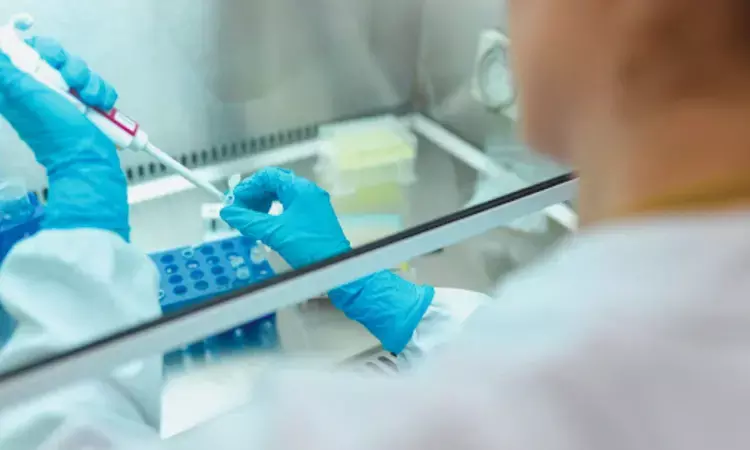- Home
- Medical news & Guidelines
- Anesthesiology
- Cardiology and CTVS
- Critical Care
- Dentistry
- Dermatology
- Diabetes and Endocrinology
- ENT
- Gastroenterology
- Medicine
- Nephrology
- Neurology
- Obstretics-Gynaecology
- Oncology
- Ophthalmology
- Orthopaedics
- Pediatrics-Neonatology
- Psychiatry
- Pulmonology
- Radiology
- Surgery
- Urology
- Laboratory Medicine
- Diet
- Nursing
- Paramedical
- Physiotherapy
- Health news
- Fact Check
- Bone Health Fact Check
- Brain Health Fact Check
- Cancer Related Fact Check
- Child Care Fact Check
- Dental and oral health fact check
- Diabetes and metabolic health fact check
- Diet and Nutrition Fact Check
- Eye and ENT Care Fact Check
- Fitness fact check
- Gut health fact check
- Heart health fact check
- Kidney health fact check
- Medical education fact check
- Men's health fact check
- Respiratory fact check
- Skin and hair care fact check
- Vaccine and Immunization fact check
- Women's health fact check
- AYUSH
- State News
- Andaman and Nicobar Islands
- Andhra Pradesh
- Arunachal Pradesh
- Assam
- Bihar
- Chandigarh
- Chattisgarh
- Dadra and Nagar Haveli
- Daman and Diu
- Delhi
- Goa
- Gujarat
- Haryana
- Himachal Pradesh
- Jammu & Kashmir
- Jharkhand
- Karnataka
- Kerala
- Ladakh
- Lakshadweep
- Madhya Pradesh
- Maharashtra
- Manipur
- Meghalaya
- Mizoram
- Nagaland
- Odisha
- Puducherry
- Punjab
- Rajasthan
- Sikkim
- Tamil Nadu
- Telangana
- Tripura
- Uttar Pradesh
- Uttrakhand
- West Bengal
- Medical Education
- Industry
Investing in Education and Research in LMICs Could Boost Global Health, Study Reveals

Research
India: A recent review on the gap in biomedical research output between High-Income Countries (HICs) and Low- and Middle-Income Countries (LMICs) has emphasized the importance of establishing global partnerships, distributing resources equitably, and enhancing research skills to develop a more varied and impactful global biomedical research landscape.
This review highlights the urgent need for interventions to address them. The study, set to be published in the September 2024 issue of the National Board of Examination - Journal of Medical Sciences, is being shared with our news portal in advance by the author.
“By investing in education, training, and research infrastructure in LMICs, we can enhance their capacity to conduct high-quality research and contribute to global health initiatives,” the lead author Professor Dr. Raju Vaishya, Department of Orthopaedics, Indraprastha Apollo Hospitals, New Delhi, told Medical Dialogues.
He suggested that “fostering partnerships between researchers from HICs and LMICs can facilitate knowledge exchange and accelerate progress in addressing global health challenges.”
Mentioning the global implication the lead author said “The disparities in biomedical research output lead to unequal access to healthcare, particularly for diseases that disproportionately affect LMICs. This can exacerbate health inequities and hinder the development of effective interventions for global health challenges. Additionally, the lack of research capacity in LMICs can limit their ability to contribute to the global knowledge base and drive innovation.”
To examine the factors behind the disparities and suggest possible solutions to address this global imbalance, Dr. Raju Vaishya and his team authored a review article.
In the review article, researchers identified these factors contributing to disparities:
- Unequal funding between HICs and LMICs.
- LMICs lack advanced infrastructure and technology, widening the research output gap compared to HICs.
- Developed countries have extensive networks for collaboration, while UMICs and LMICs struggle with forming global partnerships, limiting their access to expertise.
- Developed countries lead in high-impact publications, while researchers from developing nations face challenges in gaining recognition and citations.
- Global health research often focuses on diseases affecting wealthier regions, ignoring those prevalent in resource-limited settings.
To bridge the gap:
- Provide financial support for local research, invest in infrastructure, and offer scholarships for LMIC researchers.
- Focus on technology transfer and knowledge exchange to help LMICs improve their research capabilities.
- Support capacity-building programs and enhance data collection and analysis infrastructure, as seen with the Global Fund's HIV surveillance systems.
- Encourage inclusive collaborations, such as those by the African Center of Excellence, India-US Science and Technology Cooperation, and Brazil's Human Genome Project, which lead to impactful research.
- Developing countries, despite being behind, show potential due to high research output; increased investment could enhance their contributions, with Brazil, India, and South Africa making notable progress.
Dr. Raju Vaishya concluded that “This particular analysis was driven by a desire to provide a comprehensive overview of the factors contributing to this disparity and to identify potential solutions. By understanding the root causes of this inequality, we can develop more targeted interventions to address it and improve global health outcomes."
Reference: Vaishya, R., Sharma, D., Sibal, A., Puri, B., Muralidharan, M., & Vaish, A. (2024). Enhancing global biomedical research: Educational strategies for bridging the gap between HICs and LMICs.Journal of Medical Sciences, 2(9). https://doi.org/10.61770/NBEJMS.2024.v02.i09.xxx
BDS, MDS(orthodontics)
Dr. Garima Soni holds a BDS (Bachelor of Dental Surgery) from Government Dental College, Raipur, Chhattisgarh, and an MDS (Master of Dental Surgery) specializing in Orthodontics and Dentofacial Orthopedics from Maitri College of Dentistry and Research Centre. At medical dialogues she focuses on dental news and dental and medical fact checks against medical/dental mis/disinformation
Dr Kamal Kant Kohli-MBBS, DTCD- a chest specialist with more than 30 years of practice and a flair for writing clinical articles, Dr Kamal Kant Kohli joined Medical Dialogues as a Chief Editor of Medical News. Besides writing articles, as an editor, he proofreads and verifies all the medical content published on Medical Dialogues including those coming from journals, studies,medical conferences,guidelines etc. Email: drkohli@medicaldialogues.in. Contact no. 011-43720751


